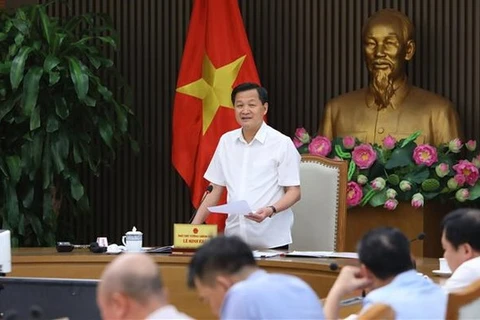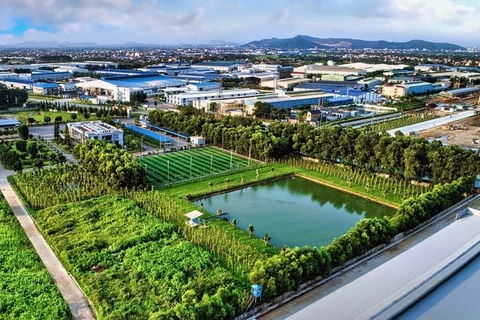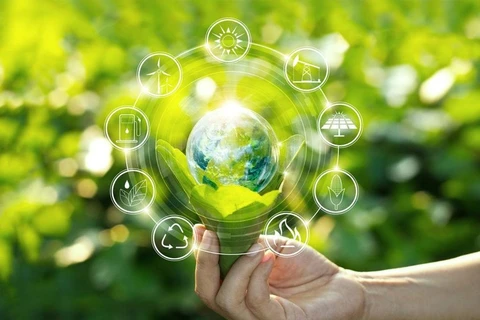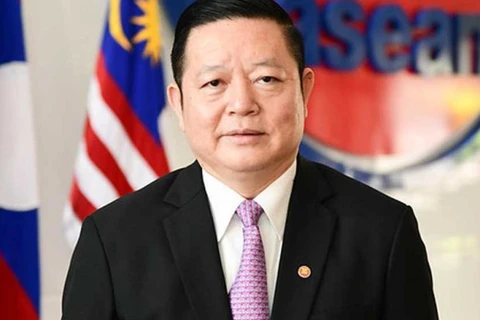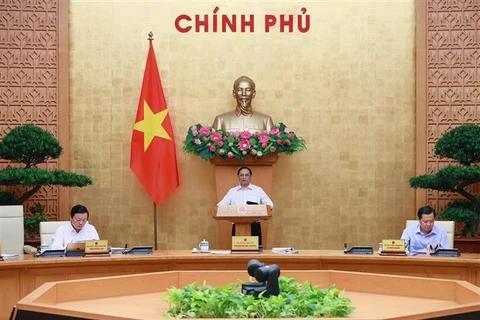 Officials pose for a joint photo at the eighth Meeting of the ASEAN Working Group on Chemicals and Waste. (Photo: VietnamPlus)
Officials pose for a joint photo at the eighth Meeting of the ASEAN Working Group on Chemicals and Waste. (Photo: VietnamPlus) Hanoi (VNA) - As a responsible and active member of the Association of Southeast Asian Nations (ASEAN), Vietnam hopes to cooperate with the international community, and strengthen cooperation in preventing illegal cross-border transport of hazardous chemicals and waste under international frameworks and the agreed systems.
Deputy Minister of Natural Resources and Environment Vo Tuan Nhan made the remarks while addressing the eighth Meeting of the ASEAN Working Group on Chemicals and Waste (AWGCW-8), held by the ministry and the ASEAN Secretariat in Hanoi from July 5 to 7.
He noted that the meeting takes place in the context that environmental pollution caused by chemicals and waste is becoming one of the serious threats to human health and the planet. Particularly, the ASEAN region is also one of the hot spots of pervasive plastics pollution.
Earlier, the meetings of the Conferences of the Parties to the Basel, Rotterdam and Stockholm Conventions, held in Switzerland in May 2023, chose the theme “Accelerating action: Targets for the sound management of chemicals and waste”, showing an urgent request for dealing with chemical and waste issues.
 Deputy Minister of Natural Resources and Environment Vo Tuan Nhan addresses the AWGCW-8. (Photo: VietnamPlus)
Deputy Minister of Natural Resources and Environment Vo Tuan Nhan addresses the AWGCW-8. (Photo: VietnamPlus) The event is an occasion for ASEAN member states to review their cooperation in chemical and waste management over the past years and lay out orientations and principles of regional cooperation in the time ahead.
The main items on the agenda include updates on decisions of meetings within the ASEAN framework, and the implementation of the working group's plan of action. More include the inter-sectoral initiatives on chemicals and waste, and the outcomes of the meetings of the Conferences of the Parties to the Basel, Rotterdam, and Stockholm Conventions in 2022 and 2023. Other agenda items include issues related to the Montreal Protocol and the Minamata Convention, and ASEAN’s cooperation with development partners and specialised agencies on chemicals and waste, Nhan said.
He expressed his hope that the AWGCW-8’s outcomes will help strengthen cooperation between the bloc’s member countries and partner organisations and, more importantly, create a greener ASEAN.
In that spirit, Vietnam pledges to continue the environmentally-friendly management of hazardous chemicals and waste throughout their life cycle, and minimise waste based on circular economy principles. It also hopes to comply with existing legal frameworks and national policies, and continue to perfect the legal framework on the management of persistent organic pollutants and waste by aligning its legal regulations with the international conventions, the official said.
He added the country will keep working closely with other ASEAN members, non-ASEAN countries, and international partners to mobilise resources for capacity building, technology transfer, and sharing of experience and the best practices. It will also boost technical collaboration to secure the environmentally safe management of hazardous chemicals and waste and fight against the illegal transport of hazardous chemicals and waste to the region in a more effective manner.
The meeting attracted officials of Vietnamese ministries and sectors, along with domestic and international experts. Participants also include members of the ASEAN Secretariat and representatives of partner organisations such as the United Nations Environment Programme, the Institute for Global Environmental Strategies of Japan, the Economic Research Institute for ASEAN and East Asia, the German Agency for International Cooperation, and the World Bank.
Founded in late 2015, the AWGCW convenes its meeting annually in rotation among ASEAN member states./.

